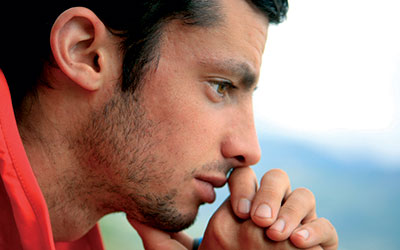Some people climb mountains. Kilian Jornet runs up them.
In fact, he has sprinted up and down Mount Kilimanjaro, Mont Blanc, and the Matterhorn — and he’s done it faster than anyone, ever. Consider ascending and descending Africa’s highest mountain, Kilimanjaro, a 32.9-mile round trip of 13,960 vertical feet to Uhuru Peak. Jornet made the dash in seven hours and 14 minutes.
His tenacity has been called superhuman. The New York Times describes him as “the most dominating endurance athlete of his generation,” while Outside magazine labels him simply and succinctly “the world’s best.” And yet the 25-year-old ultrarunner, ski mountaineer, and mountain biker is sanguine and philosophical about his feats: It’s all just a way to see and experience more of the mountains that he loves.
“I like discovering new mountains, new valleys, new places,” he explains. “Running is just a way to get there faster.”
Jornet was raised in the shadow of the Catalan Pyrenees of Spain, where he learned high-alpine survival skills from his mother. When he was just 5 years old, he climbed his first mountain — the Pyrenees’ highest peak, 11,000-foot Aneto. His sheer fascination with mountains has driven him higher ever since.
Jornet started ski mountaineering in 1999 and competed in his first mountain-running event in 2005. Since then, his race victories have stacked up. He’s a four-time winner of Europe’s Skyrunner World Series and three-time champion of the grueling Ultra-Trail du Mont Blanc. In 2011, he won the world’s oldest 100-miler, the Western States Endurance Run through California’s Sierra Nevada range. And in 2012, he finished first in Colorado’s Pikes Peak Marathon.
It should come as no surprise, then, that he titled his new book Run or Die (Velo Press, 2013). Jornet is committed to running. And he loves to compete; one chapter is even entitled “Adrenaline Comes With a Number.”
Yet he writes in a rare mix of earnestness coupled with a sense of humor about his adventures. His descriptions of races are intense — and yet at other times deeply thoughtful, even profound.
“Winning isn’t about finishing in first place. It isn’t about beating the others. It is about overcoming yourself. Overcoming your body, your limitations, and your fears,” Jornet writes.
“Isn’t this a part of why we run?” he continues. “To find out whether we can overcome our fears, that the tape we smash when we cross the line isn’t only the one the volunteers are holding, but also the one we have set in our minds? Isn’t victory being able to push our bodies and minds to their limits and, in doing so, discovering that they have led us to find ourselves anew and to create new dreams?”
Experience Life | Describe the experience of long-distance running and why it appeals to you.
Kilian Jornet | Running long distance is really special. It’s really extreme. After the first 15 or 20 hours, all the runners’ bodies start to have pain and you have that pain until you finish the race. So you still have five or 10 hours when you need to run and try not to think about the pain. You must just follow it and keep going. I think it is one of the most interesting things to work with your brain to push through this pain to the finish.
EL | Does your body ever get used to running such extreme distances?
KJ | I remember a long race I ran in 2008 and I needed three weeks to recover. The year after, my recovery time was much shorter, and the year after, it was much shorter still. Now, two days after finishing my race, I am completely recovered because the body is really intelligent in this way. It knows what has happened and it knows what to do to recover. It also knows how to forget about the pain.
EL | What do you think about when the pain sets in?
KJ | In the beginning of a race, it’s nice when you are with people, just talking and enjoying the moment together. But then when the moments start to get a bit boring or it becomes hard to talk and you need to take more energy for running, it’s interesting to have music, or audiobooks, or to think you are Indiana Jones and you have people chasing you. And then there is a moment when nothing can keep the brain from thinking about the pain. The brain starts to say, “OK, I just want to finish. I want to sleep. I want to eat a pizza.” And I think it’s the dream that you want to sleep and eat a pizza that makes you finish.
But you really need to be aware of when it is just pain or if that pain means injury. The point is to know your body.
EL | What music do you listen to as you run?
KJ | I like different styles of music and my iPod has a very strange playlist. I can be listening to a classical Bach song one moment and switch to a punk song right after.
EL | Are there psychological benefits to pushing beyond one’s comfort zone?
KJ | I think everybody has a history — how it was when you were a kid and when you were a teenager. How it has been in your life shapes your personality. I think ultrarunners have strong personalities because, to be happy with the pain, you need to fight. A lot of times it is because you are fighting against other things that are deeper in your mind or in your background. It’s a kind of psychotherapy, running long distances, because you are fighting against the things that are deep in you.
EL | What is the key to performing at an elite athletic level?
KJ | The key is to work. And for me as an ultrarunner, to work is to be out in the mountains, to understand how the ground is, how the rocks move, and then to work. It is to spend hours and hours and hours training. And years. And for that I think the most important thing is to have passion for the thing that takes the work. You are going to go running not because you want to win a race but because you enjoy it.
I’m extremely lucky — and I’m also extremely grateful because running is my passion and I know it’s not always easy to earn a living from our passions. But I think that pursuing our dreams is what gives sense to our world, so I think it’s worth the try.
EL | In your book you write, “If I have to give up chocolate in order to win a race, then bring on defeat.” What is your favorite chocolate?
KJ | (Laughing) Guilty! I like all sorts of chocolate, but I think Nutella wins!



This Post Has 0 Comments